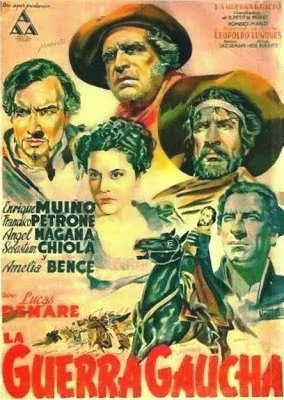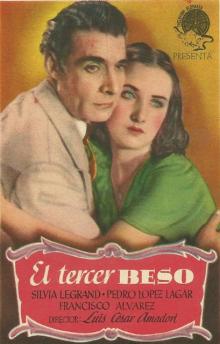Related Research Articles

Such Is Life is a 1939 Argentine melodrama film directed by Francisco Múgica and starring Enrique Muiño, Elías Alippi, Enrique Serrano and Sabina Olmos. Based on a successful play by Nicolás de las Llanderas and Arnaldo Malfatti, it focuses on the history of a bourgeois family from Buenos Aires from the beginning of the 20th century to the present.

The Gaucho War is a 1942 Argentine historical drama and epic film directed by Lucas Demare and starring Enrique Muiño, Francisco Petrone, Ángel Magaña, and Amelia Bence. The film's script, written by Homero Manzi and Ulyses Petit de Murat, is based on the novel by Leopoldo Lugones published in 1905. The film premiered in Buenos Aires on November 20, 1942 and is considered by critics of Argentine cinema to be one of the most successful films in history. It won three Silver Condor awards, including Best Film, Best Director, and Best Adapted Screenplay, given by the Argentine Film Critics Association at the 1943 Argentine Film Critics Association Awards for the best films and performances of the previous year.

Elvira Fernández, vendedora de tiendas is a 1942 Argentine comedy film directed by Manuel Romero. It stars Paulina Singerman, Juan Carlos Thorry, Tito Lusiardo and Sofía Bozán. The film is about the daughter of a millionaire store owner, who organizes a worker strike.

La cuna vacía is a 1949 Argentine drama film directed by Carlos Rinaldi on his directorial debut. It stars Ángel Magaña, Orestes Caviglia and Nelly Duggan. The film, based on a story by Florencio Escardó, covers the turbulent life of Dr. Ricardo Gutiérrez.

El Hijo del crack is a 1953 Argentine football drama film co-directed by Leopoldo Torre Nilsson and Leopoldo Torres Ríos and starring Armando Bo and Oscar Rovito. The film, a tale of a dwindling professional football star and his son was released on December 15, 1953 in Normandie cinema in Buenos Aires. The cast involved major professional football players of the time as Mario Boyé, Tucho Méndez and Ángel Labruna and journalists such as Fioravanti. It is the last film in which Leopoldo Torres Ríos and Leopoldo Torre Nilsson worked together. The 77 minute film was produced by Sociedad Independiente Filmadora Argentina (SIFA).

Los golpes bajos is a 1974 Argentine film directed by Mario Sábato. It is a film about boxing, inspired by José María Gatica. Shot in Eastmancolor, Sabato wrote the script in collaboration with Mario Mactas. The film stars Aldo Barbero, Héctor Alterio, Walter Vidarte and Ana María Picchio.

Alita Blanca Barchigia, better known as Alita Román, was an Argentine film actress of the Golden Age of Argentine Cinema (1940–1960).

Jorge Salcedo was a popular Argentine actor of radio, television and feature films, who appeared in film between 1941 and 1980.

Elías Isaac Alippi was an Argentine actor, theatrical impresario, film director and theater director, who was born and died in Buenos Aires. He is also remembered as an excellent tango dancer.
Man on Pink Corner is a 1962 Argentine film directed by René Múgica, based on the story by Jorge Luis Borges. It was shown at the Cannes and San Sebastián film festivals.
The 1943 Argentine Film Critics Association Awards ceremony was held in Buenos Aires on 10 January 1943 to honour the best films and contributors to Argentine cinema in 1942. This was the first time the awards had been presented.

The Third Kiss is a 1942 Argentine romantic drama film directed by Luis César Amadori and starring Pedro López Lagar, Silvia Legrand and Amelia Bence. At the 1943 Argentine Film Critics Association Awards, Amelia Bence won the Silver Condor Award for Best Actress for her performance in the film.

His Best Student is a 1944 Argentine biographical drama film directed by Lucas Demare and starring Enrique Muiño and Ángel Magaña. It was released in Buenos Aires on 22 May 1944. The film won many awards, including the award for best film of the year.

Los martes, orquídeas is a 1941 Argentine black and white comedy film directed by Francisco Múgica and starring Mirtha Legrand, Enrique Serrano, Juan Carlos Thorry and Nuri Montsé. It won the Argentine Best Picture award for 1941. It was remade as the Hollywood classic You Were Never Lovelier (1942), starring Fred Astaire and Rita Hayworth.
Medio millón por una mujer is a 1940 Argentine film.

El tesoro de la isla Maciel is a 1941 Argentine comedy film directed by Manuel Romero.
Savage Pampas is a 1945 Argentine historical film directed by Lucas Demare and Hugo Fregonese and starring Francisco Petrone, Luisa Vehil and Domingo Sapelli. The film's sets were designed by Germán Gelpi. The film is set in the nineteenth century in the Dry Pampas, when it represented a frontier between Argentine-controlled territory and areas still largely inhabited by Indians before the Conquest of the Desert extended Argentine control southwards. In 1966, Fregonese remade the film in English under the same title.

Paulette Christian was a French-Argentine vedette, singer and actress of film, theater and television who had a long career in Argentina. Christian had been a member of the anti-Nazi resistance during World War II. She spent seven years in the US. She made her acting career during Argentina's golden age of film and television. She appeared with José Cibrian, Osvaldo Miranda, Angel Magaña, Zulma Faiad, Jorge Larrea, Susana Campos, Amelia Bence, among others. She debuted on television in 1955. She was a pioneer in the French bataclanas style in Argentina, along with May Avril and Xénia Monty. She committed suicide in 1967.

Estudios San Miguel was an Argentine film studio that was active in the 1940s and early 1950s. It flourished during the golden age of Cinema of Argentina, and at its peak was one of the major studios in Buenos Aires. Genres ranged from musical comedy to costume drama and gaucho thriller. Films included La guerra gaucha, co-produced with Artistas Argentinos Asociados, and the comedy Juvenilia (1943), both of which won several major awards. Eva Duarte, soon to become the first lady of Argentina as Eva Perón, appeared in two of the studio's films in 1945. The studio became overextended financially and ceased production after 1952.
Beatriz Día Quiroga was an Argentine radio and television actress.
References
Citations
- 1 2 Honest Person Needed, IMDb.
- ↑ Trelles Plazaola 1989, p. 142.
- ↑ Maranghello 2005, p. 91.
- 1 2 Berardi & Peroni 2006, p. 90.
- ↑ Berardi & Peroni 2006, p. 64.
- ↑ Masso 2000, p. 115.
- ↑ Persona Honorada Se Necesita:Synopsis, msn entertainment.
- ↑ Maranghello 2002, p. 27.
Sources
- Berardi, Mario; Peroni, Laura (2006-01-01). La Vida Imaginada: Vida Cotidiana y Cine Argentino, 1933-1970. Ediciones del Jilguero. ISBN 978-987-9416-09-9.
- "Honest Person Needed". IMDb. Retrieved 2014-06-08.
- Maranghello, César (2002-01-01). Artistas Argentinos Asociados: La Epopeya Trunca. Ediciones del Jilguero. ISBN 978-987-9416-04-4 . Retrieved 2014-06-08.
- Maranghello, César (2005). Breve Historia del Cine Argentino. Laertes editorial, S.A. ISBN 978-84-7584-532-6 . Retrieved 2014-06-08.
- Masso, Ernesto (2000). Paola Durante: Víctima de la Procuraduría del Distrito Federal: historia de una infamia. Planeta. ISBN 978-970-690-164-4 . Retrieved 2014-06-08.
- "Persona Honorada Se Necesita:Synopsis". msn entertainment. Retrieved 2014-06-08.[ permanent dead link ]
- Trelles Plazaola, Luis (1989-01-01). South American Cinema/ Cine De America Del Sur: Dictionary of Film Makers/ Diccionario De Los Productores De Peliculas. La Editorial, UPR. ISBN 978-0-8477-2011-8 . Retrieved 2014-06-08.